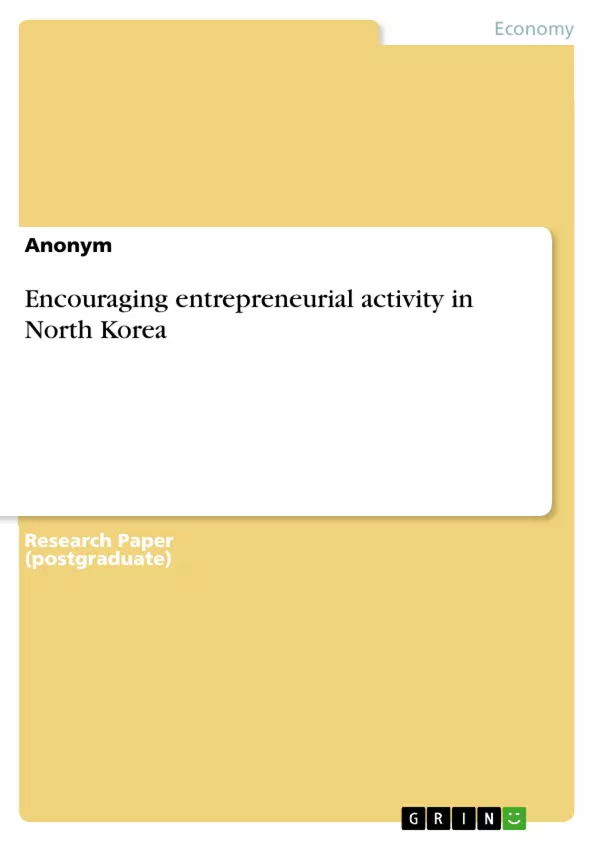North Korea is one of the most isolated countries in the world, with a centrally planned economy that has stifled entrepreneurial activity for decades. It is known for its strict laws and regulations under communist rule since the end of the Second World War. The government controls every aspect of the economy, and entrepreneurial activity is severely restricted. However, with recent changes in the country's economic policies, the government has recently taken some measures allowing start-up entrepreneurs to emerge and contribute to the economy's growth. Encouraging entrepreneurial activity in North Korea, however, comes with significant challenges.
Inhaltsverzeichnis (Table of Contents)
- Encouraging Entrepreneurial Activity in North Korea
- Challenges for Start-up Entrepreneurs in North Korea
- Lack of access to capital
- Lack of entrepreneurial culture
- Legal and regulatory barriers
- Limited access to technology and infrastructure
- The Isenberg Model
- Cultural Norms and Values
- Human Capital
- Financial Resources
Zielsetzung und Themenschwerpunkte (Objectives and Key Themes)
This text explores the potential for encouraging entrepreneurial activity in North Korea. The author analyzes the existing challenges and opportunities, focusing on the need for structural reforms and cultural shifts to foster a supportive environment for entrepreneurs.
- Challenges to entrepreneurial activity in North Korea
- The potential of the Isenberg Model for North Korea's entrepreneurial ecosystem
- The role of culture, human capital, and financial resources in fostering entrepreneurship
- The need for government policy changes and support for private enterprise
- The potential for informal economic activities and the need for a shift in cultural attitudes toward entrepreneurship
Zusammenfassung der Kapitel (Chapter Summaries)
- Encouraging Entrepreneurial Activity in North Korea: The text introduces the context of North Korea's isolated and centrally planned economy, highlighting the challenges and opportunities for entrepreneurial activity. It discusses the current economic policies and the potential for growth with increased entrepreneurial involvement.
- Challenges for Start-up Entrepreneurs in North Korea: This section outlines the key barriers faced by start-up entrepreneurs in North Korea, including limited access to capital, a lack of entrepreneurial culture, legal and regulatory barriers, and insufficient access to technology and infrastructure. Each of these challenges is discussed in detail.
- The Isenberg Model: The text introduces the Isenberg Model as a framework for assessing the components of an entrepreneurial ecosystem. The author argues that the model can be applied to North Korea's unique context, providing insights into the strengths and weaknesses of its entrepreneurial ecosystem.
- Cultural Norms and Values: This section discusses the impact of North Korea's culture and values on entrepreneurial activity. The author analyzes the fear and repression that discourage risk-taking and innovation, highlighting the potential for change with a shift towards a more open and supportive environment.
- Human Capital: The text explores the limitations imposed by the government's control of education and the workforce in North Korea. The lack of skilled individuals and the brain drain are presented as significant challenges to developing a thriving entrepreneurial ecosystem.
- Financial Resources: This section focuses on the limited access to capital and the lack of financial infrastructure in North Korea. The author discusses the government's control over financial institutions and the absence of support for private investors, highlighting the need for reforms to address these challenges.
Schlüsselwörter (Keywords)
The text focuses on the challenges and opportunities of encouraging entrepreneurial activity in North Korea. Key topics include the Isenberg Model, entrepreneurial ecosystem, government policy, cultural norms and values, human capital, financial resources, access to capital, access to technology, and legal and regulatory barriers.
Frequently Asked Questions
Is entrepreneurial activity possible in North Korea?
While severely restricted by a centrally planned economy, recent policy changes have allowed some start-up entrepreneurs to emerge and contribute to economic growth.
What are the biggest challenges for North Korean entrepreneurs?
Key barriers include a lack of access to capital, legal and regulatory hurdles, limited infrastructure, and a culture that discourages risk-taking.
What is the Isenberg Model?
The Isenberg Model is a framework used to assess the various components of an entrepreneurial ecosystem, such as policy, finance, culture, and human capital.
How does North Korean culture affect innovation?
Fear and repression under communist rule have historically stifled entrepreneurial culture, making structural reforms and a shift in values necessary for growth.
What role does human capital play in North Korea's economy?
The government's control over education and the workforce limits the development of skilled individuals, leading to a "brain drain" that hinders a thriving ecosystem.
- Arbeit zitieren
- Anonym (Autor:in), 2023, Encouraging entrepreneurial activity in North Korea, München, GRIN Verlag, https://www.grin.com/document/1363918



